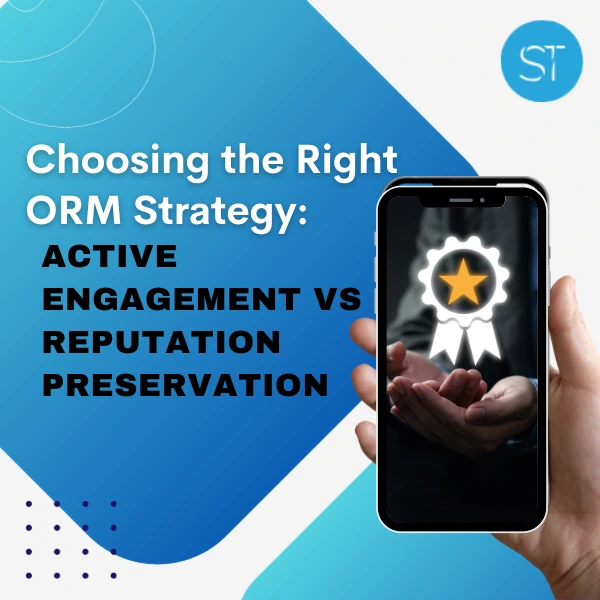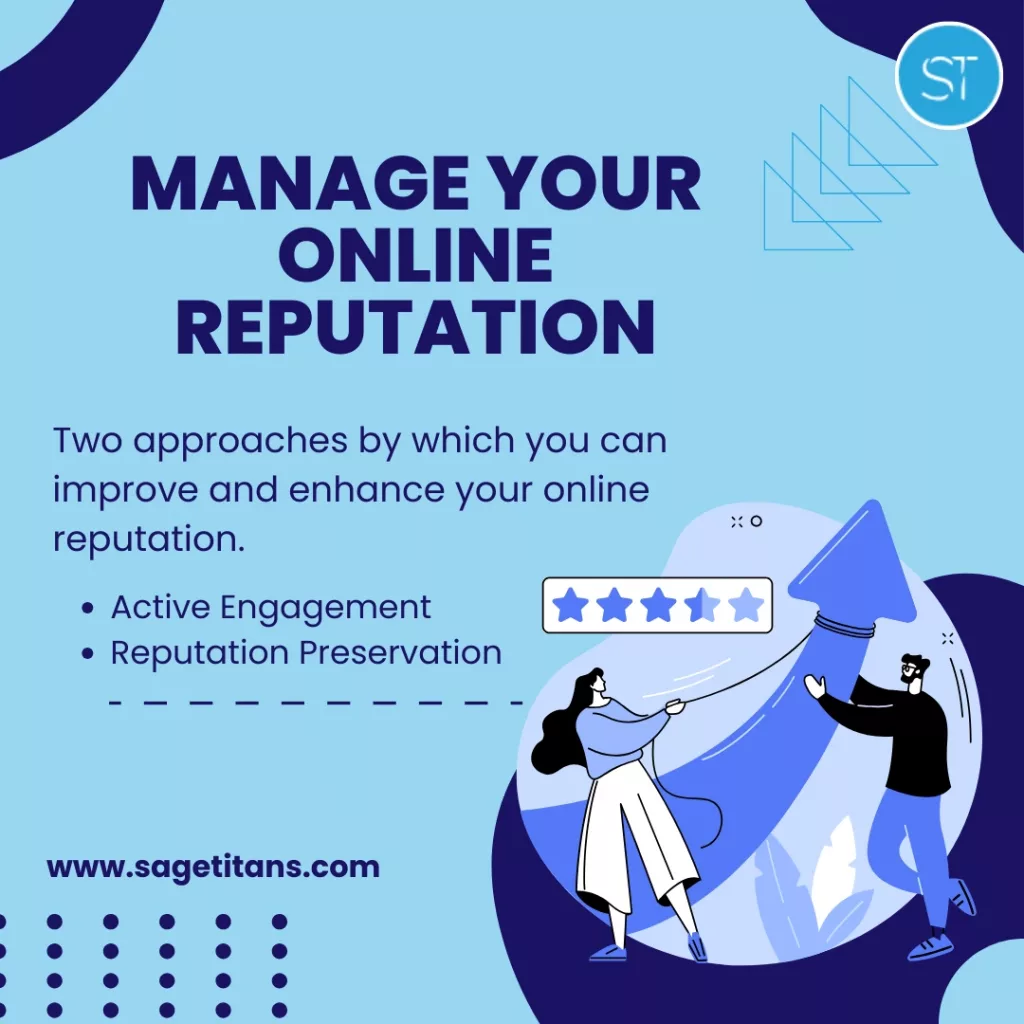
Online Reputation Management Strategy: Active Engagement vs Reputation Preservation
ORM (Online Reputation Management) is the process of monitoring, influencing, and controlling an individual’s or business’s online reputation. It entails taking a proactive approach to developing a favorable digital image by actively engaging with online material, responding to comments, and enhancing online profiles. ORM attempts to change public perception, lessen the impact of bad reviews or material, and create trust among online audiences, eventually protecting and increasing one’s digital reputation.
The Impact of ORM
Individuals and corporations may benefit greatly from effective online reputation management (ORM). For starters, it helps to develop trust and credibility among online audiences, since a favorable online image increases a person’s or brand’s perceived reliability. Second, ORM aids in reducing the potential damage produced by unfavorable reviews or material, therefore averting long-term reputational impact. Third, a good internet reputation may lead to enhanced consumer loyalty, which can lead to new clients and prospects. Furthermore, ORM might affect customer decisions since individuals frequently base their selections on internet evaluations and impressions.
Trust and Credibility
An effective online reputation management strategy fosters trust and credibility among potential consumers or stakeholders. A positive digital presence, consisting of positive evaluations and information, increases an individual’s or business’s perceived dependability, impacting decision-making processes.
Business Success
A positive internet reputation has a direct influence on business success. Positive evaluations and a positive online image attract more consumers, while efficient management of bad information helps offset possible brand reputation harm, sustaining and encouraging development.
Consumer Perception and Loyalty
Online reputation management is critical in molding consumer perception and cultivating loyalty. Engaging with consumers regularly, resolving problems, and keeping a positive online presence all contribute to a positive image, which increases customer loyalty and advocacy.
How to know your online reputation?
In the digital era, monitoring your online reputation is critical for maintaining a positive and impactful digital presence.

Google Yourself
Run frequent Google searches for your name or your company to determine what information is freely available. Pay close attention to the first few pages of search results because they are frequently the most powerful in molding perception.
Set up Google Alerts
Google Alerts will notify you anytime new content involving your name or business appears online. This allows you to keep up to date in real-time and reply quickly to any new complaints or good remarks.
Monitor Social Media
Check social media sites regularly for mentions, comments, and reviews about you, your business, or something about you. To create a positive online presence, actively communicate with your audience, solve problems, and join in relevant topics.
Use Online Reputation Management products
Look into online reputation management products and services that may help you automate the monitoring process. These solutions frequently give detailed insights into mentions, reviews, and sentiment analysis, allowing you to manage your digital reputation more effectively.
Review Platforms
Keep a watch on industry-specific review platforms like Yelp, TripAdvisor, or Glassdoor. Monitor and reply to both good and negative evaluations to demonstrate your dedication to client satisfaction and affect public perception.
How to Manage Your Online Reputation?
Through proactive management and interaction, you may improve your digital presence and develop a favorable online reputation, there are 2 approaches by which you can improve and enhance your online reputation.
- Active Engagement
- Reputation Preservation

Active Approach to Online Reputation Management
Proactive Social Media Engagement
Engage with your target audience on social media channels. Post meaningful information regularly, react to comments and messages quickly, and participate in debates. This contributes to the development of a healthy online community and indicates your dedication to open communication.
Material Development and Optimization
Create and optimize positive material about yourself or your company. Blog postings, articles, or news releases showcasing accomplishments, community participation, or pleasant customer experiences might fall under this category. Ensure that this material ranks high in search engine results to outperform any potentially unfavorable content.
Examine and Respond to Feedback
Keep an eye out for reviews and feedback on various web platforms. Constructively respond to both good and negative feedback. Show gratitude for favorable comments while professionally responding to and resolving problems highlighted in bad evaluations. This proactive approach shows a dedication to client satisfaction.
Google Business Profile Administration
Maintain your Google Business profile with correct information, high-quality photos, and regular changes. Encourage pleased customers to submit good reviews, and fix any concerns expressed in negative reviews as soon as possible. A well-maintained Google Business profile improves visibility and reputation.
Thought Leadership and Online Branding
Establish yourself or your company as an authority in your area. Participate in relevant online networks, contribute to industry forums, and publish guest articles. Positioning oneself as a thought leader not only improves your online reputation but also builds trust and credibility within your target audience they can relate with you more and you can put a positive mark.
Reputation Preservation Strategy Approach for Online Reputation Management
Avoid Online Arguments
Failure to monitor online arguments and reviews regularly. Ignoring what others are saying about you or your company online may result in lost chances for development, and unfavorable remarks may go unanswered, thus hurting your reputation.
Communicate with your Employees
Communicate with your employees regularly and know their views or expectations. Provide a platform and encourage them to speak their mind freely. Make them feel appreciated.
Utilize Forums to Filter Out Images
You can filter out your images online by using forums. One great example is Reddit with over 1 billion users which is facilitated by various discussions but the prime target discussions of your business must contain the audience discussing you or your brand. On revelation of such discussions, follow the discussion, give advice, and answer questions. It will help to raise authority and positive visibility.
Who Needs Online Reputation Management?
Businesses
Businesses must have a positive internet reputation. Customers frequently rely on internet reviews and ratings to make educated purchasing selections. A poor internet reputation may have a substantial impact on sales and brand credibility.
Individual Professionals
Online reviews may have a significant impact on professionals such as physicians, attorneys, and consultants. A positive internet presence can attract new customers, whilst a poor one will repel them.
Job Seekers
Employers frequently perform web research on prospective seekers. A bad Internet reputation, such as unprofessional social media posts or unfavorable articles, might make it difficult to find work.
Big Shots
Individuals in the public glare, such as celebrities and public figures, are subject to scrutiny. They may use online reputation management to control their story, limit unfavorable news, and preserve a positive public image.
Nonprofit Organizations
Nonprofit organizations, too, must maintain their internet reputation. Donors and supporters may be swayed by what they discover online. A good reputation may help with fundraising and the overall influence of the organization.
Online Reputation Management with Digital Marketing
Combining online reputation management (ORM) and digital marketing is an effective technique. A positive internet reputation boosts the efficiency of digital marketing initiatives. Consumer decisions are influenced by social proof, reviews, and testimonials, making ORM a crucial component of trust development. Because digital marketing platforms like as social media and content marketing help shape perceptions, it is critical to manage online reputation regularly.
Furthermore, SEO tactics can improve the exposure of positive material by overshadowing any unfavorable remarks. ORM and digital marketing collaboration guarantee a consistent and attractive online presence, boosting the effect of promotional activities and sustaining long-term success in the digital arena. Digital marketing experts have well-mannered plans for an effective online reputation with very good performance.
Bonus tips
Treat your online reputation like a politician. You are committed to the public simultaneously, not just to one person.
There are many ways to deal with the ORM crisis but some fundamental rules in ORM remain the same. Here is the list:
- Understand your target audience.
- Be entirely honest.
- React quickly and pleasantly.
- Encourage your customers to leave feedback.
- Increase your online presence frequency.
- Collaborate with social influencers.
Wrapping up
Choosing the correct online reputation management plan is critical for success. Examine project requirements, performance consequences, database compatibility, and scalability. Consider team familiarity and talents. A strong online image develops consumer loyalty and creates trust, all of which have a direct influence on business performance. Google searches, alarms, and social media may all be used to keep track of your reputation. Engage actively by managing social media, creating positive content, responding to comments, and optimizing Google My Business. A passive strategy, such as disregarding feedback or ignoring social media, risks having a detrimental influence. To learn more about Online Reputation Management, you may also refer to this Online reputation management guide.
